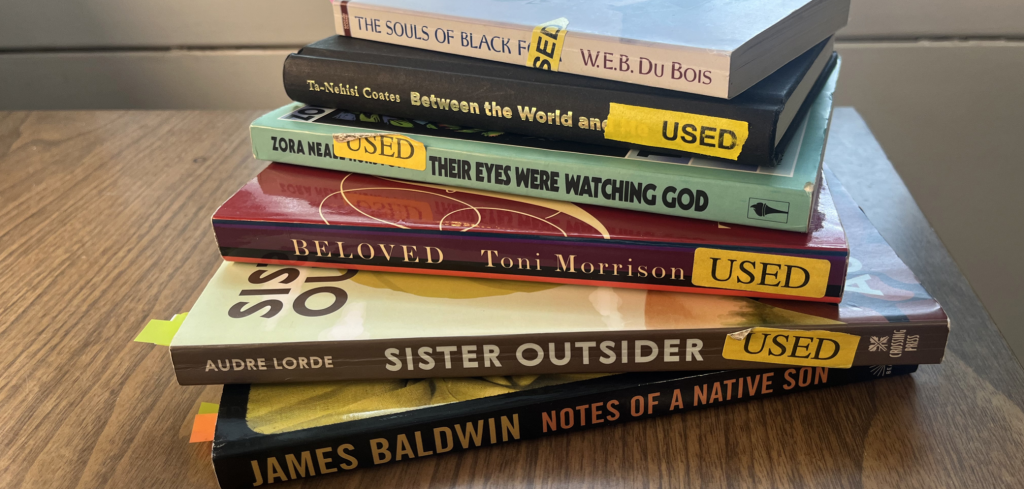
At the end of the 2023-2024 academic year, the English department may have offered its last African American literature class for the coming years. The course was one of six that Dr. Bruce Mills offered; all six are at risk of disappearing.
Whenever a professor retires, their course line — the courses they teach — leaves with them. Last year, when Mills announced his retirement, the English department filed a formal proposal to replace him, but due to large campus-wide budget deficits, several proposals for course line replacements were paused — including theirs, said English Department Chair Marin Heinritz.
As a result of last year’s failed proposal, Mills’ course line will be absent next year, with a possibility of returning for the 2025-2026 academic year if the English department’s current proposal is approved.
As listed on the English department’s website, Mills’ six courses taught are Reading the World: Genre: Blues Narratives, Reading the World: Identities, New World Narratives: American Literature 1500-1790, Reform and Renaissance: U.S. Literature 1790-1865, Building the Archive: Baldwin and His Legacy, and of course, African American Literature at varying levels.
While all six courses are at risk of cancellation, the department is most concerned about the removal of the African American Literature course. The department fears that without the course, the department and the school will lose credibility.
“In a department of our size, it’s a huge red flag to not offer a dedicated class to African American literature,” said Heinritz.
This year, the English department drafted another proposal for the return of the classes. According to Heinritz, there are eight proposals for new hires across all departments. The department’s understanding is that there are up to three available positions for new professors.
While requesting a replacement for Mills, the English department drafted a proposal to the Educational Policies Committee (EPC) outlining why they believed the courses needed a new professor.
The EPC is a group of faculty at Kalamazoo College who receive proposals and decide whether the proposals are justified or not. In the case of Mills’ replacement, the proposal was accepted and moved on to the provost, Dr. Danette Ifert Johnson, and the president, Jorge Gonzalez, with whom the final decision will be made.
On May 20, the faculty executive committee — a group of faculty who provide oversight and governance — as well as the department chairs and the provost met about the process in terms of where proposals and searches were at.
“After last year, which was such a big surprise about the process and how it happened, we didn’t really feel terribly included in the decision-making process, and so it’s changed dramatically this year so that there’s more transparency, more inclusivity,” said Heinritz.
This meeting was a reaction to the sentiment of teachers and faculty who felt ignored in the decision process last year. With this meeting, everyone involved in the process was heard and seen.
Even though Mills’ area of specialty is early American literature, he developed a specialty in African American literature through his studies. For the next potential professor, the department is requesting an African American specialist.
In a memo the English department circulated to faculty in February 2024 as a response to the paused line, the department stated, “In this context, having an African Americanist is uniquely important not only to having a healthy English program but also to having a healthy and robust liberal arts education at Kalamazoo College.”
Mills has been teaching at Kalamazoo College since the summer of 1993, but the African American literature course was a staple of the English department before his arrival.
In his time, he’s seen lots of changes, the most notable being the increase in students and faculty of color at K. This increase has changed the school greatly in Mills’ eyes, and he hopes the school continues to push diversity. However, Mills still acknowledges K as a predominately white institution.
“The school is in a threshold place,” said Mills. “There have been times in the past five years where the majority of students [in my class] were students of color. That would have never happened [before].”
Mills reflected on the current state of K and the progress the school has made. He noticed how students of color were generally more inclined to speak and participate when they were not a minority than when they were.
For this reason, Mills believes it is much more important for the school to promote diversity and to continue the trend of the increasing number of students of color at the school. The increase in students of color could create more conversations in the classroom and create a more diverse culture at K.
“I don’t have information about final decisions at this point,” said Johnson in an email.
The department is currently waiting for the provost and president’s decision, which will come after spring term.
Mills also thought about the class in the context of contemporary politics in the country. Though the course is something that will directly affect Kalamazoo College students, the message of the class’ removal could have ripple effects in the community.
“I’m concerned that we are at a time in the country when African American history and literature are being removed,” Mills said.

Leave a Reply